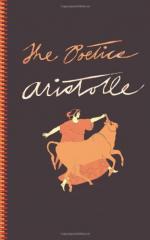
|
| Name: _________________________ | Period: ___________________ |
This test consists of 15 multiple choice questions and 5 short answer questions.
Multiple Choice Questions
1. As Aristotle explains, why must a poet be sensitive to the nature of language?
(a) The nature of language in unpredictable.
(b) Language is very complicated.
(c) Language is to a poet as paint is to a painter.
(d) There are infinite words from which to choose.
2. Aristotle asserts that the main character of a tragedy must have what?
(a) A lot of money.
(b) Complete confidence.
(c) A tragic past.
(d) Weakness.
3. According to Aristotle, what type of poets attempt to create tragedies that result in everyone ultimately being happy?
(a) Innovative poets.
(b) Poets more concerned with pleasing their audience.
(c) Optimistic poets.
(d) Poets more interested in winning an award.
4. As Aristotle states, what ways are epic poems different from other poems, specifically tragedies?
(a) The meter of epic poems is unimportant.
(b) They are of considerably greater length and scope.
(c) They are much shorter.
(d) They tend to rhyme.
5. Aristotle says that simply doing what well leaves a mediocre piece of art?
(a) Giving the reader a sense of suspense.
(b) Developing a main character that does not have a close friend.
(c) Infusing irony just at the beginning.
(d) Writing a complication and unraveling.
6. In a good tragedy, Aristotle explains that the misfortune the main character experiences is usually caused by what?
(a) The character's arrogance.
(b) The character's weakness.
(c) Misguided love.
(d) Stupidity.
7. Into how many parts does Aristotle divide the plot of a tragedy?
(a) Aristotle does not divide the plot of a tragedy, but rather sees it as a whole.
(b) Four.
(c) Two.
(d) Three.
8. What does Aristotle believe to be the goal of tragedy?
(a) To inspire anger.
(b) To inspire fear and pity.
(c) To inspire pity.
(d) To inspire fear.
9. If the problem conquers the characters, how does Aristotle say the tragedy ends?
(a) Successfully.
(b) It ends just at the right time.
(c) Happily.
(d) Unhappily.
10. When is a sign considered to be poorly used in the plot device of recognition according to Aristotle?
(a) When the sign is recognized, but no action is taken.
(b) When the sign goes unrecognized.
(c) When the sole purpose of the sign is for recognition.
(d) When the sign is destroyed.
11. According to Aristotle, why do the greatest tragedy poets always choose characters that belong to such groups?
(a) A character with few friends is more interesting.
(b) A moral character is more believable.
(c) A fall from such a great height will impress the spectator.
(d) An educated character is more believable.
12. Into how many parts does Aristotle say a language can be divided?
(a) Three.
(b) Infinite.
(c) Two.
(d) Several.
13. What does Aristotle consider to be the most tragic event?
(a) Two lovers splitting up.
(b) A mother abandoning her child.
(c) Adultery.
(d) A member of a family killing another.
14. To Aristotle, what type of recognition is considered superior to any other kind?
(a) Recognition based on rumors.
(b) Recognition through the use of a sign.
(c) Recognition through reasoning.
(d) Recognition through a holy experience.
15. Aristotle explains that tragedies should have what that other poems do not?
(a) More sadness.
(b) Death.
(c) More irony.
(d) A much more limited scale.
Short Answer Questions
1. What is the third type of recognition as identified by Aristotle?
2. What type of tragedy does Aristotle say does NOT require impressive visual effects when performed on stage to impress their spectators?
3. Based on Aristotle's teachings, if the main character of a tragedy is totally without fault, his fall would not be due to his own fault, but rather what?
4. Based on Aristotle's "Poetics", great tragedy poets always choose characters that belong to what?
5. What is the purpose of the conclusion according to Aristotle?
|
This section contains 665 words (approx. 3 pages at 300 words per page) |

|




